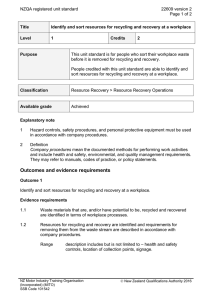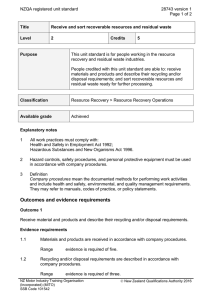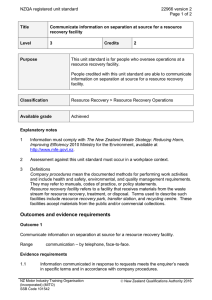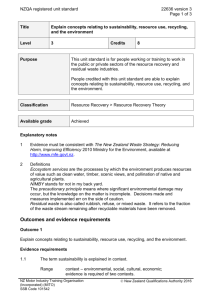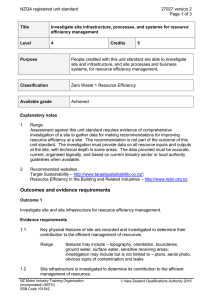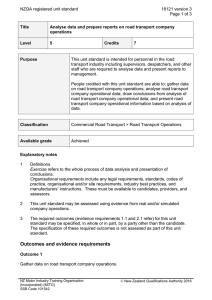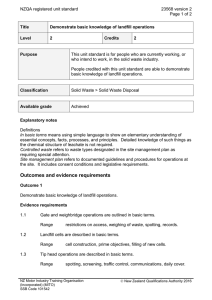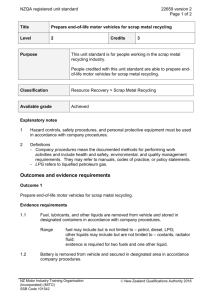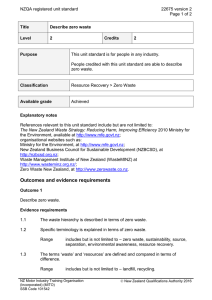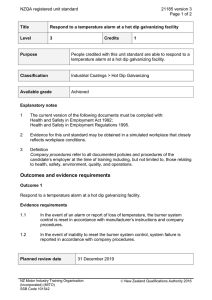NZQA registered unit standard 22634 version 3 Page 1 of 3
advertisement
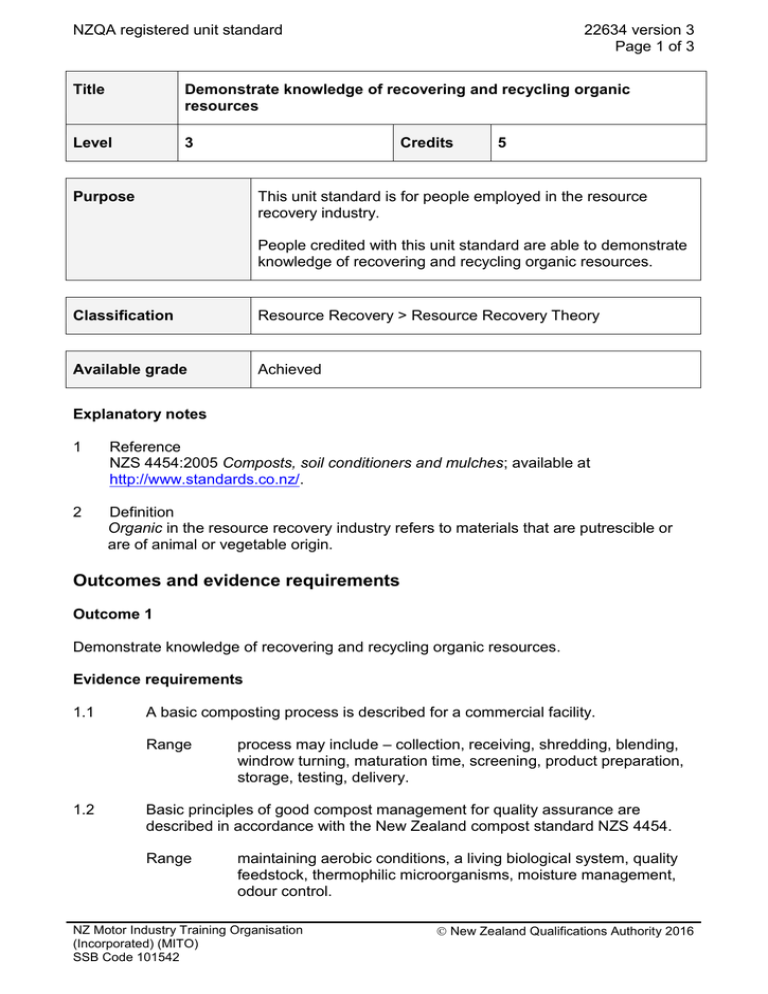
NZQA registered unit standard 22634 version 3 Page 1 of 3 Title Demonstrate knowledge of recovering and recycling organic resources Level 3 Credits Purpose 5 This unit standard is for people employed in the resource recovery industry. People credited with this unit standard are able to demonstrate knowledge of recovering and recycling organic resources. Classification Resource Recovery > Resource Recovery Theory Available grade Achieved Explanatory notes 1 Reference NZS 4454:2005 Composts, soil conditioners and mulches; available at http://www.standards.co.nz/. 2 Definition Organic in the resource recovery industry refers to materials that are putrescible or are of animal or vegetable origin. Outcomes and evidence requirements Outcome 1 Demonstrate knowledge of recovering and recycling organic resources. Evidence requirements 1.1 A basic composting process is described for a commercial facility. Range 1.2 process may include – collection, receiving, shredding, blending, windrow turning, maturation time, screening, product preparation, storage, testing, delivery. Basic principles of good compost management for quality assurance are described in accordance with the New Zealand compost standard NZS 4454. Range maintaining aerobic conditions, a living biological system, quality feedstock, thermophilic microorganisms, moisture management, odour control. NZ Motor Industry Training Organisation (Incorporated) (MITO) SSB Code 101542 New Zealand Qualifications Authority 2016 NZQA registered unit standard 1.3 Differences between in-vessel composting and open windrow composting are identified and described. Range 1.4 two differences. Key features of anaerobic digestion are identified and described in relation to emerging organic recycling technology. three of – typical feedstocks, energy from waste, bio-gas, methane production, process control, basic system design, potential issues. Range 1.5 Key features of thermal combustion as a potential organic recycling technology are described. thermal combustion includes but is not limited to – incineration, other high temperature waste to energy systems such as pyrolysis and gasification, burning woody material as firewood; evidence is required of one example of thermal combustion. Range 1.6 Key features of commercial vermiculture are identified and described in relation to organic recycling technology. Range 1.7 22634 version 3 Page 2 of 3 typical feedstock, basic processes, containment, breeding, harvest, marketing, sales. An explanation is given of the role and benefits of home composting and of animals in organic recycling. Range one example each. Planned review date 31 December 2019 Status information and last date for assessment for superseded versions Process Version Date Last Date for Assessment Registration 1 26 January 2007 31 December 2012 Revision 2 20 May 2011 31 December 2017 Review 3 16 April 2015 N/A Consent and Moderation Requirements (CMR) reference 0114 This CMR can be accessed at http://www.nzqa.govt.nz/framework/search/index.do. Please note Providers must be granted consent to assess against standards (accredited) by NZQA, before they can report credits from assessment against unit standards or deliver courses of study leading to that assessment. NZ Motor Industry Training Organisation (Incorporated) (MITO) SSB Code 101542 New Zealand Qualifications Authority 2016 NZQA registered unit standard 22634 version 3 Page 3 of 3 Industry Training Organisations must be granted consent to assess against standards by NZQA before they can register credits from assessment against unit standards. Providers and Industry Training Organisations, which have been granted consent and which are assessing against unit standards must engage with the moderation system that applies to those standards. Requirements for consent to assess and an outline of the moderation system that applies to this standard are outlined in the Consent and Moderation Requirements (CMRs). The CMR also includes useful information about special requirements for organisations wishing to develop education and training programmes, such as minimum qualifications for tutors and assessors, and special resource requirements. Comments on this unit standard Please contact the NZ Motor Industry Training Organisation (Incorporated) (MITO) info@mito.org.nz if you wish to suggest changes to the content of this unit standard. NZ Motor Industry Training Organisation (Incorporated) (MITO) SSB Code 101542 New Zealand Qualifications Authority 2016
